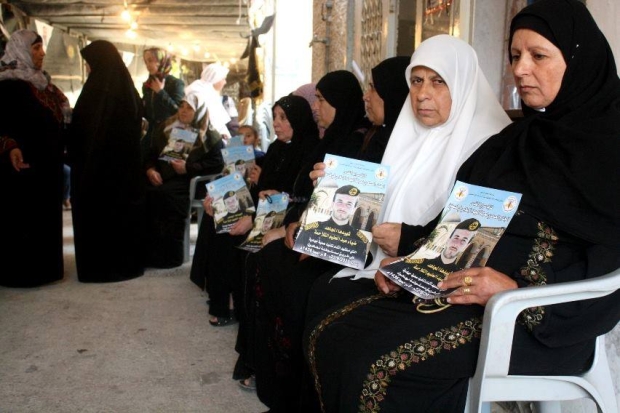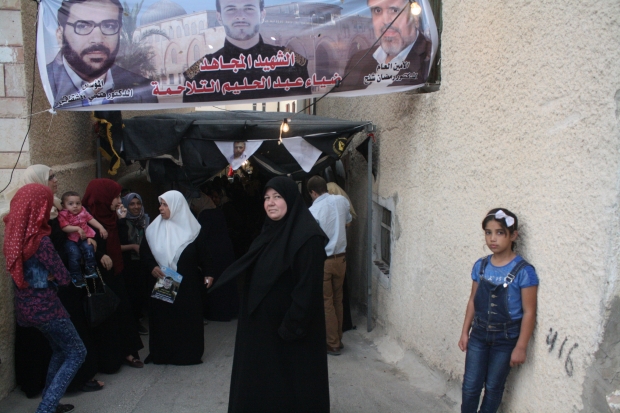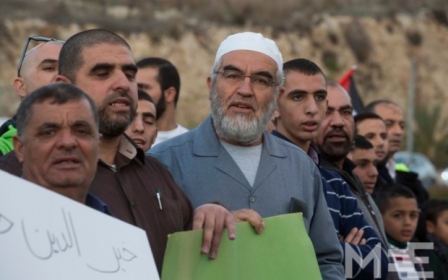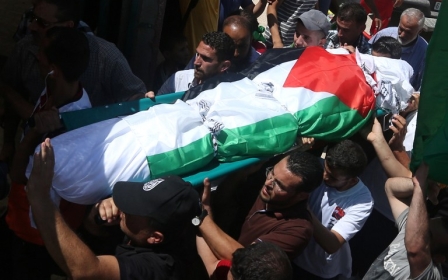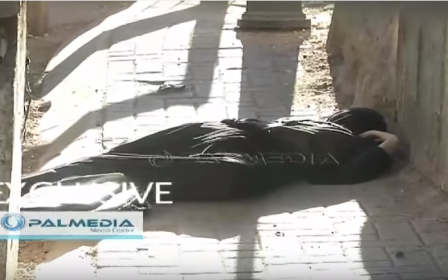Explosion likely caused death of young Palestinian: PA medic
The doctor's statement contradicts claims made by Palestinian Authority security forces, who say the young man was shot by Israeli soldiers
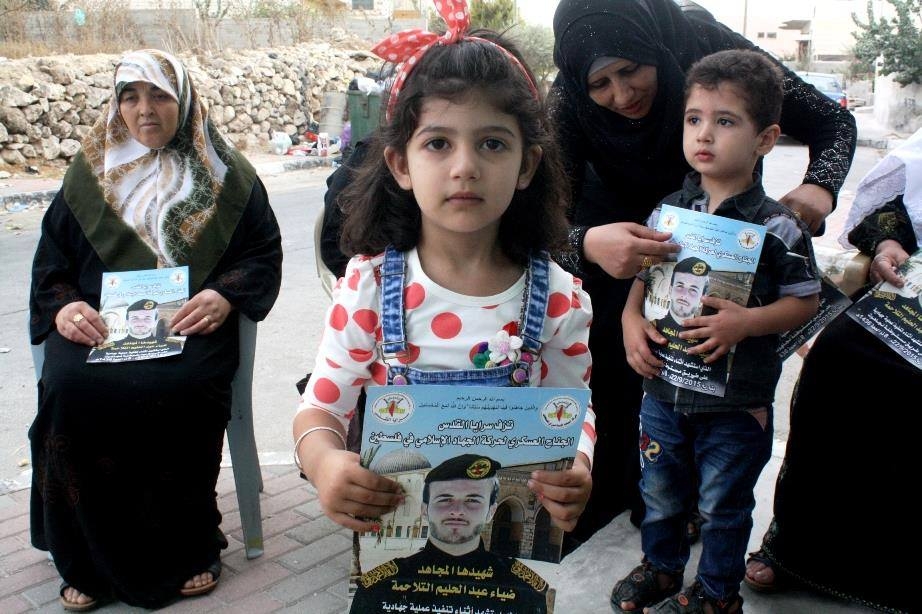
A local girl in the West Bank town of Khursa holds up a poster depicting Diaa al-Talahmeh, a Palestinian who died in unclear circumstances last week (MEE/Killian Redden)
Published date: 29 September 2015 10:43 BST
|
Last update: 9 years 1 month ago
KHURSA, Occupied Palestinian Territories - A young Palestinian who died under disputed circumstances late on Monday suffered injuries consistent with an explosion, a Palestinian medical official has concluded.
The findings by the ER doctor who treated Diaa al-Talahmeh contradict claims by Palestinian security and political officials who have blamed Israeli gunfire for the 21-year-old’s death. Echoing Talahmeh’s family, the Ramallah-based Palestinian government accused Israeli forces of shooting the young man to death in an unprovoked attack.
Talahmeh was the first of three young Palestinians to die in quick succession since Monday; Israel has been implicated in all three deaths. But its forces have disputed any role in Talahmeh’s death, insisting he accidentally killed himself while hurling a bomb.
On Friday, Dr Ahmad Abu Sneid told Middle East Eye that his examinations of the body “did not confirm” a bullet wound. Rather, al-Talahmeh’s injuries - among them cuts to his hand, chest and neck - appeared to be “from explosive material” rather than gunfire. Abu Sneid stopped short of identifying those he believed were responsible. But his findings were likely to be welcomed by Israeli officials who are facing unusually intense scrutiny and international attention this week over the use of deadly force against Palestinians.
Hamas as well as Islamic Jihad, a Palestinian faction that claimed Talahmeh as a member, denounced the purported shooting and called for more attacks against Israel.
Family members and neighbours described Talahmeh as a typical university student. He was studying computer science at al-Quds University, they said, insisting he showed little interest in politics. They described Talahmeh as the last person they would suspect of possessing - and much less attempting to detonate - an explosive device.
'They kill anyone'
Mourners gathered outside Talahmeh’s family home in Khursa village near Hebron on Thursday dismissed the military’s account as a fabrication.
“They kill anyone,” his mother told MEE, pointing to the shooting death of a Hebron teenager just hours after her own son was killed.
At a Hebron checkpoint soon after Talahmeh's death, Israeli forces shot and killed 18-year-old Hadil al-Hashlamon, later claiming she tried to stab soldiers. Photographs later emerged seeming to prove that the woman posed no threat. The Israeli military has maintained its version of events about that incident, which it says is under review. Amnesty International has since labeled the shooting of Hashlamun an "extrajudicial assassination".
Talahmeh's mother added that her son had acted normally during his final hours alive. She said he was returning from the gym in Dura, a nearby village, as he often did late at night. The route to his home passes close to an Israeli military post.
She said that after the events leading to her son’s death - events she described as a shooting - residents and medics were prevented from accessing the site. She and others in Khursa said they became aware that the incident had occurred only after the shooting; they said no clashes preceded it. It was only after several hours had passed that she and her husband discovered it was their own son at the centre of the commotion.
The mother cut off in mid-sentence a neighbour, Wafa Shadid, as she described to MEE a hand injury accompanying Talahmeh’s injuries. She reiterated that her son was shot to death, describing bullet wounds on his head and neck.
Israeli forces prevented journalists from approaching Talahmeh’s body before handing it over to the Palestinian Authority. Footage taken after his body was moved shows steps outside of a home covered in blood. Above them, a window is shattered.
Ali Manaa, the supervisor at Alia Hospital who was present when Talahmeh’s body arrived early Tuesday, told MEE that the hand injury, apparently the result of burns, was superficial and could not have caused his death. He believed the injury offered evidence that any explosive device Talahmeh might have been handling was not powerful enough to cause his death. His fingers were blackened but remained intact, he said.
Manaa agreed with the family that the cause of death was a single gunshot wound to the head. With the exception of a single bullet hole above Talahmeh’s right temple, the medic said the young man had received no other significant wounds.
“We saw only one gunshot,” he said.
No x-rays were taken to confirm this, nor was an autopsy performed.
Abu Sneid, the attending physician, said Talahmeh’s family sought to retrieve his body quickly for burial, leaving little time for further examinations.
Images of Talahmeh taken after his body was released show a face covered in blood. Footage recorded as Talahmeh’s body was moved to an ambulance outside Alia Hospital appeared to show a serious wound at the right temple.
Days later in Khursa, Talahmeh's mother, who did not provide her name to reporters, held up a poster depicting her son wearing a photoshopped uniform of Islamic Jihad. Nevertheless, relatives insisted the young man was apolitical. Asked for a copy of the poster, relatives would only provide one of the young man wearing civilian clothes.
Israel considers Islamic Jihad a terrorist organisation. It is also a major political rival of Fatah, the party of President Mahmoud Abbas whose members dominate the government and security forces of the Palestinian government in the West Bank.
After the attack, according to relatives, soldiers entered the family home only briefly. They held Talahmeh's family members in one room for 15 minutes, although, the mother said, they neither searched nor confiscated anything from the home.
In previous incidents, Israeli forces have ransacked the homes of Palestinian attackers and seized laptops and other evidence. It was not clear why the searches after Talahmeh’s death would have been so limited.
Unanswered questions
Israel has not accused Talahmeh of belonging to Islamic Jihad or any other group. Asked if his motivations or any other aspect of the alleged attack were under investigation, the army declined to comment.
Nor did the military respond to basic inquiries about the circumstances surrounding the young men's death. Asked if its forces had opened fire on Talahmeh at any point during the incident, the army declined to comment.
In an emailed statement, the military reiterated its initial account: “The IDF (received) reports from civilians regarding a road blocked to vehicular movement with rocks adjacent to Horsa (southwest of Hebron).
“Moments after forces arrived at the scene, they reported hearing an explosion. In searches conducted in the area shortly after, the forces identified a body. Initial (inquiry) suggests the suspect (attempted) to hurl an IED at an army vehicle when it detonated.”
In another incident on Thursday, Ahmad Izzat Khatatbeh, 26, died a week after being shot three times in the shoulder, chest and abdomen. The Israeli military said its forces opened fire after a Palestinian threw an explosive device at an army patrol.
Palestinian officials have continued to blame Israel for shooting Talahmeh to death.
In Ramallah, government spokesman Ihab Bsiso described the alleged killing “a continuation of Israel’s policy of attacks and violations committed against the unarmed Palestinian people”.
He added that “this crime, along with others, constitute a blatant violation of international norms and conventions".
Hamas spokesman Mousheer al-Masri, meanwhile, said that the “killing of the martyrs al-Hashlamon and al-Talahmeh are crimes by the Israeli occupation and it should have to pay for them”.
New MEE newsletter: Jerusalem Dispatch
Sign up to get the latest insights and analysis on Israel-Palestine, alongside Turkey Unpacked and other MEE newsletters
Middle East Eye delivers independent and unrivalled coverage and analysis of the Middle East, North Africa and beyond. To learn more about republishing this content and the associated fees, please fill out this form. More about MEE can be found here.


